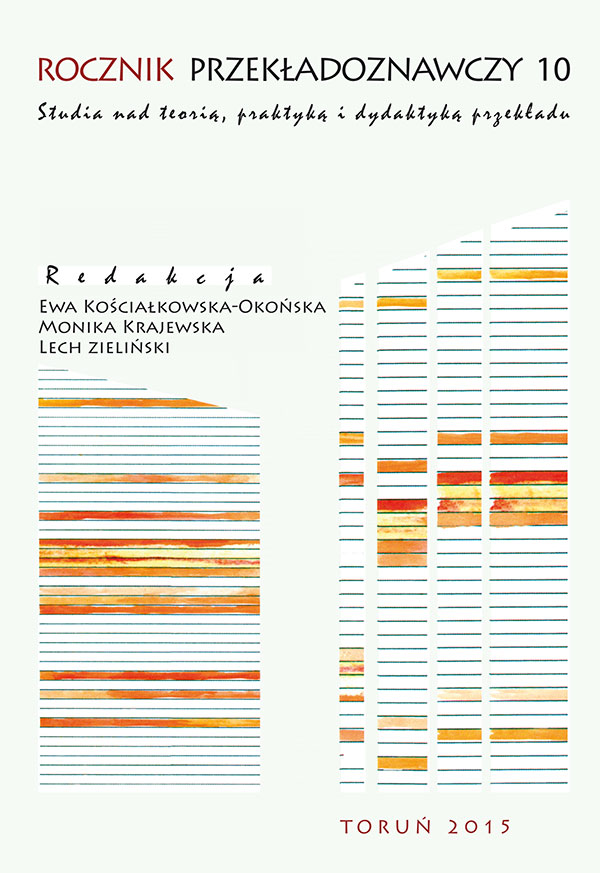Translation of semantic phraseological innovations
DOI:
https://doi.org/10.12775/RP.2015.009Keywords
phraseological innovations, translation strategies, translation problemsAbstract
The object of considerations focuses on problems related with the translation of semantic innovations of idioms. The first part of the article introduces the concepts of idioms, idiomatic standards and phraseological innovations. Phraseological connections or idioms are multi-word units that have a relatively stable form and meaning. This meaning is not a combination of the meanings of separate words that form the unit. A norm is accepted by a community and defined as a standard set of rules pertaining to the use and occurrence of idioms. The most common phraseological innovations are demetaphorisation, semantic contamination, desemantisation and idiom accumulation in the text. The effect of innovations is the fusion of the above mentioned factors with a text making it unique and one of its kind. Innovations expand and determine utterances. What is more, they are added value expressed by a pun. Translation of idioms may cause many problems, especially when they appear in the form and meaning different from the standard one. The main strategies in the translation of innovations are literal translation, using a different idiom that reflects the meaning of the original text, paraphrasing or creating new lexical units. Examples of semantic innovations and their translation strategies have been derived from the novel by Gunter Grass and its Polish translation.
References
Bąba, S., 1989, Innowacje frazeologiczne współczesnej polszczyzny, Poznań.
Burger, H., Buhofer, A., Sialm, A., 1982, Handbuch der Phraseologie, Berlin.
http://dx.doi.org/10.1515/9783110849394
Dziamska-Lenart, G., 2006, „Z zagadnień defrazeologizacji stałych związków wyrazowych”, [w:] Z zagadnień frazeologii, stylistyki i kultury języka, S. Bąba, P. Fliciński (red.), Poznań, s. 33–43.
Fliciński, P., 2011, „Innowacje frazeologiczne w świetle danych korpusowych”, [w:] Poznańskie Studia Polonistyczne. Linguistic Series, nr 18, s. 9–19.
Koller, W., 1972, Grundprobleme der Ubersetzungstheorie, Bern.
Koller, W., 1994, „Phraseologismen als Ubersetzungsproblem”, [w:] EUROPHRAS 92, B. Sandig (red.), Bochum, s. 351–373.
Koller, W., 2007, „Probleme der Ubersetzung von Phrasemen”, [w:] Phraseologie/ Phraseology. Handbucher zur Sprach- und Kommunikationswissenschaft, H. Burger, D. Dobrovol‘skij, P. Kuhn, N.R. Norrick (red.), Berlin–New York, s. 605–613.
Łabno-Falęcka, E., 1995, Phraseologie und Ubersetzen. Eine Untersuchung der Ubersetzbarkeit kreativ-innovativ gebrauchter wiederholter Rede anhand von Beispielen aus der polnischen und deutschen Gegenwartsliteratur, Frankfurt/M.
Mosiołek-Kłosińska, K., 2002, „Innowacje frazeologiczne jako źródło powstania nowych jednostek leksykalnych”, [w:] Problemy frazeologii europejskiej V, A.M. Lewicki (red.), Lublin, s. 21–34.
Pieńkowska, M., 2009, „Poprawne tłumaczenia z błędami. O tłumaczeniu błędów językowych użytych jako zabieg literacki”, [w:] Rocznik Przekładoznawczy. Studia nad teorią, praktyką i dydaktyką przekładu, t. 5, L. Zieliński, M. Pławski (red.), s. 165–174.
Pociask, J., 2006, „≪Trudny orzech do zgryzienia≫ – Kilka uwag o tłumaczeniu stałych związków frazeologicznych”, [w:] Rocznik Przekładoznawczy. Studia nad teorią, praktyką i dydaktyką przekładu, t. 2, L. Zieliński, M. Pławski (red.), s. 191–199.
Pociask, J., 2007, Zu Status und Funktion der idiomatischen Einheit in Pressetexten. Dargestellt an Textbeispielen aus der Neuen Zurcher Zeitung, Frankfurt/M.
Pociask, J., 2009, „Możliwości tłumaczenia innowacji w stałych związkach frazeologicznych”, [w:] Rocznik Przekładoznawczy. Studia nad teorią, praktyką i dydaktyką przekładu, t. 5, L. Zieliński, M. Pławski (red.), s. 175–189. http://dx.doi.org/10.12775/RP.2009.014
Sabban, A., 2010, „Zur Ubersetzung von Idiomen im Worterbuch und im Text: die Rolle von Kontextsensitivitat und semantischer Variabilitat”, [w:] Zeitschrift fur Translationswissenschaft und Fachkommunikation, L. van Vaerenbergh, K. Schubert (red.), Berlin, s. 192–208.
Skorupka, S., 1968, „Poprawność frazeologiczna”, [w:] Poradnik Językowy, z. 8, s. 385–392.
Wotjak, B., 1992, Verbale Phraseolexeme in System und Text, Tubingen.
http://dx.doi.org/10.1515/9783111377032
Grass, G., 1959, Die Blechtrommel, Fischer Bucherei, Frankfurt/M. (ebook).
Grass, G., 1983, Blaszany bębenek, przekł. S. Błaut, Warszawa (ebook).
Downloads
Published
Issue
Section
Stats
Number of views and downloads: 1084
Number of citations: 0



